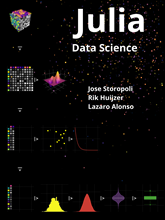Open access book teaches researchers programming language ‘Julia’

On November 1, 2021, psychology PhD student Rik Huijzer published an open access book about the programming language ‘Julia’. With the book, he hopes to give researchers tools to get started with Julia themselves.
Online forum
Huijzer – who also uses Julia for his PhD research – wrote the book together with colleagues Jose Storopoli and Lazaro Alonso. Huijzer met the Brazilian Storopoli at an online programming forum. When Storopoli wanted to write a book about Julia, he asked if Huijzer was interested in joining as well. Later Lazaro, a Mexican visualization expert, also joined.
Language of the future
According to Huijzer, Julia is the programming language of the future. Julia builds on mistakes from other programming languages, which ensures that it is a 'logical and sleek language'. Huijzer sees Julia as the successor of popular languages such as R and Python. According to the PhD student, it takes some time to learn this new language, but he believes it is a worthwhile investment. He thinks that in ten years Julia will be the most widely used research programming language.
Popular
Huijzer is not the only one who is excited about Julia: the website on which his book is published currently has more than 3600 unique visitors per month. In addition, Chinese and Brazilian translations of the book are on their way.
The open access book is available in both an online and a PDF version at: https://juliadatascience.io.
More news
-
20 January 2026
Alcohol, texting, and e-bikes
-
13 January 2026
Lonneke Lenferink joins The Young Academy
-
08 December 2025
Citizen participation essential for a sustainable energy future
